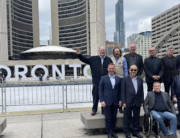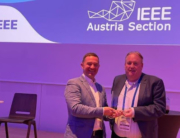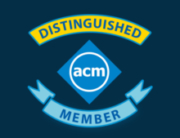Media Release
NSW Minister for Innovation Signals Strong Legislation
to Empower Whole-of-Government Data Analytics Centre
IFIP WCC 2015 Told of Ground-Breaking Initiative to Open Up Government Data
Tuesday 6 October 2015 – Daejeon, South Korea: The NSW Minister for Innovation, Victor Dominello, has promised strong legislation to require government agencies to share real-time data with his new, whole-of-government Data Analytics Centre (DAC).
In presenting his Keynote Address on ‘Data Driven Innovation’ at the IFIP World Computer Congress 2015 today, Mr Dominello told delegates that he has experienced strong resistance from some bureaucrats to his data sharing plans. However, he said he is determined to leverage open data to drive transparency, improve decision-making and accelerate positive change.
“When I served as Aboriginal Affairs, I saw some appalling examples of inefficiency and duplication, simply because different agencies didn’t know what each other was doing. By sharing data and coordinating our efforts more effectively, we can improve the quality and relevance of services we provide to our citizens,” Mr Dominello said.
The Minister quoted former New York Mayor, Michael Bloomberg, to say, “If you can’t measure it, you can’t manage it.”
“Even after just two days here in Korea, I’ve been hearing the same messages that I hear back home – that governments fail to share the data and that we live in silos. But information is power,” Mr Dominello said.
“To open up the data is a brave new world. When we open up government, when we show you transparency, you get to see us, you get to judge us. Yes, opening up data is brave, but it’s also critical. When we open up the data then we empower technical experts like the ones here in this room to start implementing and accelerating your ideas for change.”
Learning from New York’s MODA
Mr Dominello said his research with the New York Mayor’s Office of Data Analytics (MODA) identified two key obstacles which the NSW DAC will handle differently in order to be successful.
“The first is the need to do benchmarking and to establish a baseline and clear business case, so we can clearly measure what has been achieved. And the second is that the MODA did not have the legislative power to gather the data, but instead relied on mayoral goodwill, which ebbed and flowed with popularity polls,” Mr Dominello said
“We have problems to solve that cannot be addressed in silos and we will need that legislative push to make it happen. Data Analytics will give us both the detail and context so when we perform complex social policy operations, we have all the information at our fingertips.”
The Minister said that opening up government data will produce unparalleled outcomes for social innovation and improvement, providing a major stimulant to economic growth and development.
“In the Information Age, unlike in a sandstorm, you can’t put your head in the sand and wait for it to pass. The winds of change are blowing and governments, politicians and bureaucrats need to embrace that. We must lift the sails, get the wind and propel ourselves forward into the future,” Mr Dominello said.
When asked by the Chair of Korea’s Open Data Strategy Council, Jin Hyung Kim, how he planned to overcome bureaucratic resistance, Mr Dominello reiterated the need for strong legislation.
“A recent delegation from China asked me the same thing so they’re dealing with similar issues over there, but that’s why you need legislation. Only a very strong law will compel agencies to give us the data we need to make a real and positive difference to peoples’ lives,” Mr Dominello said.
Visits to Korean Data Analytics Facilities
While at WCC2015, Mr Dominello also met with Heung-Nam Kim, President of Korea’s Electronics and Telecommunications Research Institute, and Sun-Hwa Hahn, President of the Korean Institute of Science and Technology Information.
He also visited:
- the Big Data Institute at Seoul National University where he met with Professor Sang Kyun Cha,
- Songdo International Business District, a purpose-built smart city and business district,
- the Korea Advanced Institute of Science and Technology, and
- a number of technology incubators.
While travelling around Seoul, Mr Dominello took time to experience South Korea’s public transport system, including downloading the consumer app and using it to navigate different transport platforms.
ENDS
About WCC
The 23rd IFIP World Computer Congress is held in South Korea from 4-7 October, 2015. One of the largest and most important ICT conferences in the world, WCC 2015 is IFIP’s flagship event and attracts researchers, ICT professionals and academics. With the theme of “WCC 2015, Opening Our Future Together”, the Congress features presentations from leading ICT entrepreneurs, researchers and software engineers, as well as encompassing 13 specialised events and a large industry exhibition under the IFIP WCC 2015 banner. For more information, visit http://wcc-2015.org/
About IFIP
IFIP, the International Federation for Information Processing, is the global professional federation of societies and associations for people working in Information and Communications Technologies and Sciences. Established under the auspices of UNESCO in 1960 and recognised by the United Nations, IFIP represents ICT professional associations from more than 50 countries and regions with a total membership of over half a million. It also brings together more than 3,500 scientists from industry and academia, organising them into over 100 Working Groups and 13 Technical Committees to conduct research, develop standards and promote information sharing. Based in Austria, IFIP organises and supports over 100 conferences each year, fostering the distribution of research and knowledge to academics and industry practitioners alike.
Website: http://ifip.org
Twitter: http://twitter.com/ifipnews
LinkedIn: http://www.linkedin.com/company/ifip–international-federation-for-information-processing






